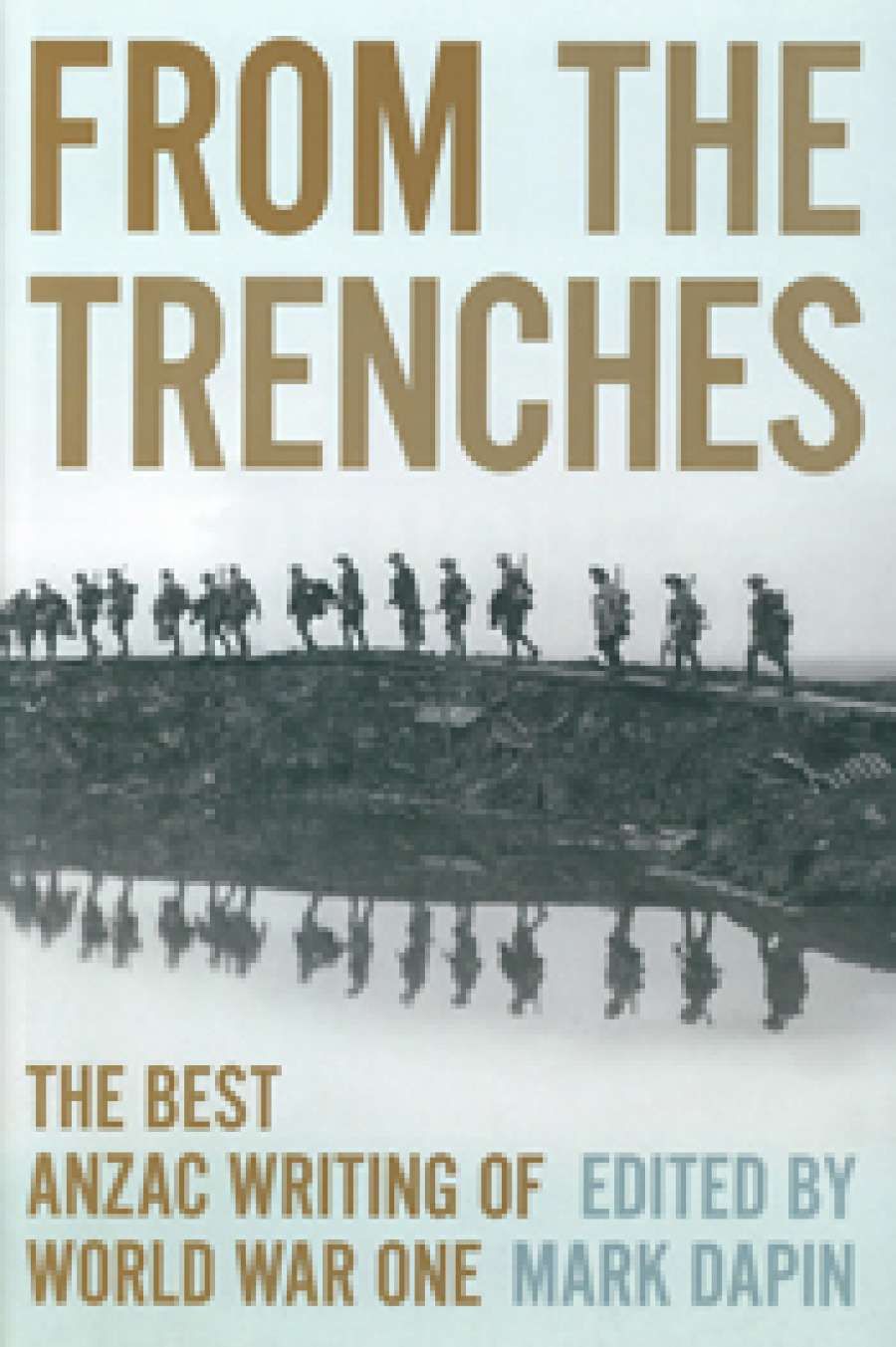
- Free Article: No
- Contents Category: Anthology
- Review Article: Yes
- Article Title: A huge and bloody mistake
- Online Only: No
- Custom Highlight Text:
Mark Dapin’s anthology, From the Trenches, is a timely but not opportunistic book. At more than 400 pages, it is long enough to suggest the sheer scale of the war and its centrality to European (if not world) history ever since. It samples all the relevant genres (letters, memoir, journalism, fiction, poetry) and offers a multiplicity of viewpoints (senior ranks, subalterns, NCOs, privates, and nurses). The book is not simplistically pro- or anti-war, but its overall message is unmistakable. The whole enterprise was a huge and bloody mistake, stupidly prolonged by inadequate politicians for more than four years.
- Book 1 Title: From the Trenches
- Book 1 Subtitle: The Best Anzac Writing of World War One
- Book 1 Biblio: Viking, $39.99 hb, 430 pp, 9780670077816
Inevitably, Dapin does not begin with the war’s causes. That would have required an entirely different work. Starting with W.J. Turner’s ominous poem ‘Death’s Men’, Dapin moves quickly to the optimistic (or should we say naïve?) account by journalist–soldier Phillip F.E. Schuler (1889–1917) of the AIF’s initial recruitment, training, and departure. Dapin then cuts, in a dramatic side-slip, to the first of numerous sickening accounts of battles on the Western Front.
The book has sections on Gallipoli, the Middle East, and two on the Western Front. All of them use a judicious mixture of genres to detail the exact nature of the fighting and the various, and changing, attitudes of the soldiers towards it. The poems by the Gallipoli veteran Leon Gellert (plus a few others by Frederic Manning and Harley Matthews, among others) are predominantly used as section breaks and sometimes as meditations on what lies between. In quality, they don’t match the aesthetic sophistication of Wilfred Owen, the throat-grabbing directness of Siegfried Sassoon, or the ironic intensity of Isaac Rosenberg, but they do well enough.
More memorable are the firsthand prose descriptions, by officers and ‘other ranks’, of the troops’ privations and the primal brutality of individual battles and extended campaigns. These are graphic in the extreme. Some have emerged only recently and have not been ‘toned down’ by the military censorship of the time. Taken successively, these accounts may seem repetitive, but their effect is cumulative. They cover a wide range of the soldiers’ emotions, from almost disabling terror to what anyone would have to describe as ‘heroism’ (often by those who were just as scared as their fellows).
Certain preoccupations, however, whether in Gallipoli or the Western Front, recur: food quality, personal hygiene (the lack thereof), the dodgy decisions of those ‘on high’, the inaccuracy of their own artillery, the loss (often in horrible circumstances) of much-valued friends – and a certain underlying respect for the enemy (whether Turk or German).
The symptoms of what we now call Post-Traumatic Stress Disorder are everywhere. Two memorable examples (among hundreds) are A.B. Facey’s note on bayonet usage in A Fortunate Life and Gellert’s poem ‘The Husband’. ‘The awful look on a man’s face after he has been bayoneted will, I am sure, haunt me for the rest of my life: I will never forget that dreadful look. I killed men too with rifle-fire – I was on a machine-gun at one time and must have killed hundreds – but that was nothing like the bayonet.’ The final lines of Gellert’s poem read: ‘I see a thousand vague and sad tomorrows. / None sees my sadness. No one understands / How I must touch her hair with bloody hands.’
Less expected perhaps are the diary kept by nurse May Tilton at a Casualty Clearing Station just back from the front lines, and the brutal, deeply disturbing account by New Zealand conscientious objector Archibald Baxter, from his memoir, We Will Not Cease (1939), particularly in regard to the so-called ‘Field Punishment Number One’.
‘It reminds one of what a great ‘‘machine’’ the war was.’
No less disconcerting, though in a different way, is the cheerful racism displayed by Edward P.F. Lynch while describing the behaviour of ‘coons’ and ‘niggers’ at Durban and Cape Town on the trip over. ‘They dive together for the coin, the thud of thick skulls meeting in an awful bash brings joy and delight to us.’ ‘We’re having the time of our young lives,’ Lynch goes on. ‘“Giving Australia a bad name,” the officers call it.’
Only slightly less depressing is the issue of class, the division between officers and ‘other ranks’. There are more accounts here by the former than the latter, and these vary considerably. Most officer–narrators have a strong concern for ‘their’ men but their assumptions remain paternalistic. Most, but not all, seem to have come from a ‘good school’ and have assumed their leadership roles readily, which doesn’t make them any less scared when they are ‘going over the top’. Some, in both fiction and memoir, draw a distinction between themselves as Australians and the more effete English officers, who are seen as pompous and distant from their men.
A further distinction may be drawn between these officer accounts ‘in the field’ and a letter by General John Monash which describes in exhaustive detail the full range of his manifold responsibilities. It reminds one of what a great ‘machine’ the war was. We can see from the soldiers’ accounts how important this administrative dimension was. Monash speaks of ‘the collection of wet socks from men in the trenches’ and the provision of ‘clean dry socks [which] are daily sent up in sacks’. It is curious that this essential service for preventing ‘trench foot’ is mentioned neither by officers nor men.


Comments powered by CComment